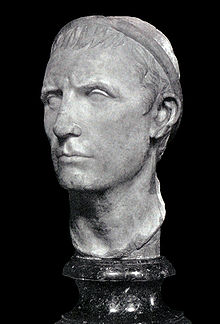
Back أنطيوخوس الثالث Arabic انطيوخوس التالت ARZ III Antiox Azerbaijani اۆچونجو آنتیوخوس AZB Антыёх III Вялікі Byelorussian Антиох III Bulgarian Antíoc III Catalan Antiochos III. Megás Czech Аслӑ Антиох III CV Antiochus III Mawr Welsh
| Antiochus III | |||||
|---|---|---|---|---|---|
| Basileus Megas | |||||
 Bust from the Louvre, possibly Roman copy of Hellenistic portrait of Antiochus III | |||||
| Basileus Megas of the Seleucid Empire | |||||
| Reign | April/June 223 – 3 July 187 BC (36 years) | ||||
| Predecessor | Seleucus III Ceraunus | ||||
| Successor | Seleucus IV Philopator | ||||
| Born | c. 241 BC Susa, Seleucid Empire | ||||
| Died | 3 July 187 BC (aged 54) Susa, Seleucid Empire | ||||
| Spouse | Laodice III Euboea of Chalcis | ||||
| Issue | Antiochus Seleucus IV Philopator Ardys Laodice of Bactria Laodice IV, Queen of the Seleucid Empire Cleopatra I Syra, Queen of Egypt Antiochis, Queen of Cappadocia Antiochus IV | ||||
| |||||
| Dynasty | Seleucid | ||||
| Father | Seleucus II Callinicus | ||||
| Mother | Laodice II | ||||
| Religion | Greek polytheism | ||||
Antiochus III the Great (/ænˈtaɪəkəs/; Greek: Ἀντίοχος ὁ Μέγας, Antíochos ho Mégas; c. 241 – 3 July 187 BC)[1] was a Greek Hellenistic king and the 6th ruler of the Seleucid Empire, reigning from 223 to 187 BC.[2][3][4] He ruled over the region of Syria and large parts of the rest of West Asia towards the end of the 3rd century BC. Rising to the throne at the age of eighteen in April/June 223 BC, his early campaigns against the Ptolemaic Kingdom were unsuccessful, but in the following years Antiochus gained several military victories and substantially expanded the empire's territory. His traditional designation, the Great, reflects an epithet he assumed. He also assumed the title Basileus Megas (Greek for "Great King"), the traditional title of the Persian kings. A militarily active ruler, Antiochus restored much of the territory of the Seleucid Empire, before suffering a serious setback, towards the end of his reign, in his war against Rome.
Declaring himself the "champion of Greek freedom against Roman domination", Antiochus III waged a four-year war against the Roman Republic beginning in mainland Greece in the autumn of 192 BC[5][6] before being decisively defeated at the Battle of Magnesia. He died three years later on campaign in the east.
- ^ "Antiochus III the Great". Livius.org. Archived from the original on 4 May 2020. Retrieved 26 March 2020.
- ^ Davies, Philip R. (2002). Second Temple studies III: studies in politics, class, and material culture. Continuum International Publishing Group. p. 95. ISBN 978-0-8264-6030-1.
The difference is that from the perspective of Antiochus III, the Greek king of a Greek empire, or from the later point of view of a head of state communicating with a Greek city-state
- ^ Garg, Gaṅgā Rām (1992). Encyclopaedia of the Hindu world, Volume 2. Concept Publishing Company. p. 510. ISBN 978-81-7022-375-7.
Antiochus III the Great. Greek king who ruled an empire including Syria and western Asia (including Mesopotamia and Iran) towards the end of the 3rd century BC. It was during his time that Bactria became independent under Euthydemos. Shortly afterwards Antiochus III crossed the Hindu Kush and attacked an Indian prince named Subhagasena (Sophagasenas of the classical writers) who ruled over the Kabul valley. Antiochus III defeated Subhagasena, extorted from him a large cash indemnity and many elephants before he went back to his country. This invasion produced no permanent effect.
- ^ Jones, Peter V.; Sidwell, Keith C. (1997). The World of Rome: An Introduction to Roman Culture. Cambridge University Press. p. 20. ISBN 978-0-521-38600-5.
Antiochus III, the Greek king of Syria (the dynasty there was called 'Seleucid'), was busily expanding in Asia Minor and in 196 BC even crossed into Europe to annex part of Thrace.
- ^ Whitehorne, John Edwin George (1994). Cleopatras. Routledge. p. 84. ISBN 978-0-415-05806-3.
...in the autumn of 192 BC they heard that Antiochus III had crossed over to Greece with his army and declared himself the champion of Greek freedom against Roman domination.
- ^ Wilson. Nigel Guy (2006). Encyclopedia of ancient Greece. Routledge. p. 58. ISBN 978-0-415-97334-2.
ANTIOCHUS III THE GREAT c242-187 BC Seleucid king Antiochus III the Great was the sixth king (223-187 BC) … Antiochus landed on the mainland of Greece posing as a champion of Greek freedom against the Romans (192 BC).